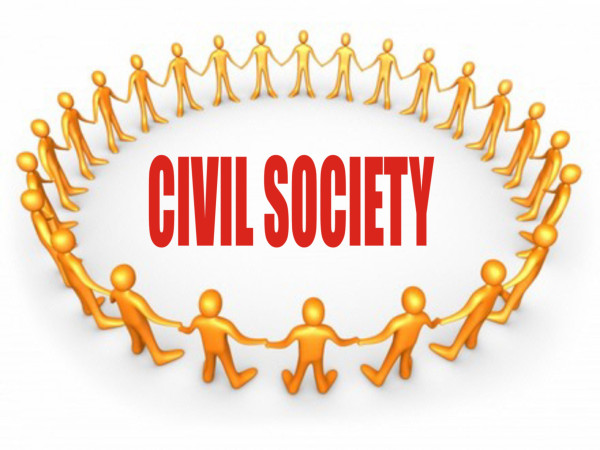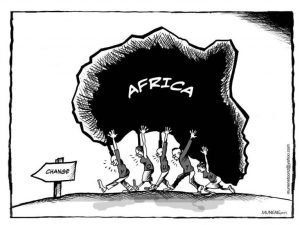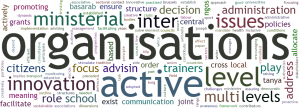Introduction
Civil society is normally attributed to non-state actors, organisations without a profit motive and usually operating in non-productive sectors such as the social services.[1] Civil society is also viewed as an enabler of various action; political participation, encouraging transparency and ensuring the rights of people.[2] In literature, civil society is widely regarded as non-governmental organisation (NGO)s, more specifically those in the global South, considered non-Western and closer to local accountability.[3] This reflects a challenge of civil society serving as a voice for the people to ensure governments fulfill their obligations. Civil society is more likely viewed as working against governments in issues of accountability or further fulfilling government mandates.[4] This article explores this dynamic in civil society playing the dual roles of encouraging government accountability in governance and human rights issues and essentially servicing the people where the government falls short. The paper further articulates the challenges faced by civil society in Africa and Botswana, in view of establishing ways in which civil society operations can be more sustainable.
The understanding of civil society
Civil society over the last two decades has been increasingly regarded as a concept in political spaces.[5] The importance of civil society is emphasised in promoting democratic values; this is evidenced through preventing or lambasting the abuse of state power, promoting democracy within the public domain, furthering human rights and representing public interests.[6] In instances where there might be shortfalls in government efforts to address challenges of public interest; civil society has replaced the state by carrying out service delivery.[7] Despite recognition of civil society as a part of non-state actors,[8] the role in which civil society is affirmed by Laine is that of a political mechanism.[9] Actions such as providing service delivery, challenging accountability and representing rights or interests are argued as political actions or influences of political platforms. For purposes of this article; this would include policy making, where governance is central. A robust civil society is increasingly more important to ensure the respect and upholding of democracy.
Civil society plays a critical role in democratic consolidation: essentially integrating culture, society and values for the stability of democracy.[10] This, however, contrasts the perception of civil society working against governments,[11] considering that many government’s mandates include promotion of culture and cohesive institution to ensure stability. Literature trends have started to document the critical role civil society plays during phases of democratic transition and consolidation.[12] For instance, civil society is viewed as a complimentary function or influence for peacebuilding efforts.[13] The non-profit motive of civil society warrants focuses in addressing problems or performing some social good for public benefit.[14] This focus can be shared among various development, international, domestic and even government institutions.[15] The shared understanding of some problems faced by a society or country creates different approaches to development. This encourages action from civil society comprised of international institutions and NGOs.[16] As a result, intersecting points arise for various international and domestic organisations to partner on common issues such as women’s empowerment or education. These common issues that can be prevalent in more than one country, necessitating regional and international effort. Thus, the presumed influence of Western influence in civil society efforts in Africa emerges. In the context of globalisation, one country cannot solve these common issues alone.[17]
Civil society as a concept is entrenched in Western political thought.[18] Although this presents some truth to the presumption that civil society work is driven by Western countries; the increasingly globalised world is reflected in democratisation processes, international law and development agendas.[19] Similar arguments could be posed in attributing the concepts of democratisation and international law as products of Western influence. A further look at the history of these two concepts; Western countries played a critical role in formulating and further promoting them. Similarly, there has been an increase in multiple jurisdiction efforts by international NGOs to complement the work carried out by NGOs. This includes sharing information and encouraging transparency and accountability in democratic processes.[20] One thing is certain; the influence of international NGOs has increased international relations and global governance.[21] Despite arguments challenging the influence of international NGOs in domestic relations, particularly in Africa, scholars have articulated that international NGO work is not a compromise to sovereignty.[22] International NGO work has enhanced global governance in international affairs where governments might not be able to play a role.[23] As a result, international relations now can no longer be separated from the role of civil society in global governance.
Notable challenges for civil society sustainability
Civil society in Africa played a pivotal role in challenging the one-party rule in the 1990s.[24] This is now seen as a threat to current government leaders seeking to stay in power.[25] The legislative environment for civil society is increasingly challenging civil society work.[26] More recently strategic litigation initiatives across the continent for controversial groups such as sexual minorities. In the context of changing or increasingly complex problems, there is a need for civil society to adopt and manage this change for their beneficiaries.[27] This becomes an attempt to balance limited resources available with funding obligations or programmes. The most critical aspect of civil society work is contingent on an enabling environment.[28] Primarily this lies with the government. The sustainability of civil society is a complex; varying from the regulatory environment, the manner in which the state engages with civil society and limited resources.
The changing landscape in North Africa during the Arab spring presented a challenge for civil society as actions were led by people and not formal organisations.[29] In part, the transition from advocating for people’s rights and interests to actually servicing them increases dependency on foreign funding.[30] In Sub-Saharan Africa however, civil society organisations are increasingly leading national issues and needs.[31] This presents the challenge of staying relevant and understanding the changing dynamics of social issues. The rapid changes in technology have enabled mobilisation for civic action. This has led to people taking action as opposed to turning to civil society for their interests to be represented. This is the case in North Africa. Civil society sustainability depends on ensuring the confidence of people’s interests and the ability to keep abreast with society’s challenges.
Another challenge faced by civil society organisations is the ability to scale up their work and grow.[32] This can be attributed to the difficulty in mobilising resources and not generating revenue or profits. The arguments for sustainability being the result of less Western funding cannot stand with the model of a civil society organisation being non-profit. Funds would still have to be raised on a regular basis leaving to question how civil society can define sustainability within the context of Africa. In the most basic form; sustainability for civil society organisations entails remaining operational regardless of economic climate conditions and forming diversified funding mechanisms inclusive of local funding sources.[33] This only merely shifts the onus of funding mechanisms from international sources to domestic sources. It does not guarantee that the same domestic sources would not experience challenges as is the current trends with decreasing international donor funding. Given the importance of funding for civil society and in view of sustainability; funding as a challenge is further explored in the following section.
Civil society funding
A country’s economic status plays a role in how civil society sources funding. In a country like Botswana that is considered higher middle income, funding is a challenge for civil society. Aside from this, civil society in some instances is merely viewed as an agent of the state or ineffective.[34] This is different from where civil society bears the state’ responsibility in service provision.[35] The difference lies in the first instance of having a civil society being complacent to state shortcomings. The latter instance is having civil society directly bridging the gap created by the state’s shortcomings. This can be highlighted as a challenge for organisations that work for unconventional or controversial groups such as sexual minorities.[36] However, in countries where sexual minorities are controversial or subject to discrimination, foreign funding is most prevalent for civil society organisations working on behalf of these groups. [37] This contrasts the general narrative of difficulty in civil society funding and further supports the Western influence narrative. Donor dependency remains an issue because of the operating model civil society organisations are formed in.[38]
Funding for African civil society organisations is channelled mainly through international NGOs.[39] This already reflects the geographical and long-standing advantage international NGOs have had in securing funding. In instances of where funding is most needed at grass root level, the funds are absorbed through other channels that determine where to invest funding. The scope of funding for civil society in Africa most notably excludes critical aspects for sustainability such as capacity building or growth.[40] Capacity building can include establishing self-funding mechanisms, improving skills or even strengthening operations and controls. In instances where there is some form of capacity building, this is normally compliance focused and not sustainability focused.[41] This, in turn, leaves the power of programming, the scope of operations and the success of civil society work in Africa to international NGOs or external partners. An added complexity to the challenge of funding is the increasingly stringent environment in which civil society organisations work in. Civil society organisations now must report on the sources of their funding.[42] In some instances, this directly links to the narrative of Western influence when governments can determine where civil society funds are sourced from. In some cases, countries have banned the receipt of foreign funding because of this.[43]
Sustainability for civil society is achieved through a culture of philanthropy.[44] In Botswana this is somewhat limited. Despite its economic status, challenges remain for citizens facing high unemployment and income inequality.[45] Arguments could be raised in respect of how shared interests would encourage philanthropy. For instance, how poverty alleviation can be tackled because of philanthropy targeting changes in policy, infrastructure and service delivery. In Bangladesh sourcing funding from alternative sources including beneficiaries of the civil society work was viewed as people having to pay for service delivery.[46] This essentially shifted the operating model of civil society organisations from non-profit to profit making.[47] In a case for women empowerment; civil society can be challenged with upscaling work within an economic downturn that results in less disposable income for philanthropists.
Civil society in Botswana
Civil society is observed as less robust in Botswana when compared to neighbouring South Africa.[48] One of the reasons is attributed to reliance on the government to solve many of the country’s problems.[49] Another reason is partly attributed to civil society’s dependence on government funding.[50] In view of sustainability this would seem fitting, however, the independence or objectivity in challenging or keeping government accountable is compromised. This presents a perspective where domestic funding might be prevalent but the effectiveness of civil society work is not. The focus on sustainability thus needs to expand beyond funding mechanisms for more meaningful insight. Civil society is a common aspect of politics.[51] When considering the role of civil society in Africa, it is most prominent in political and policy-making spaces. Botswana’s context might signal a different environment when compared to other African nations. The discovery of diamonds a year after independence resulted in a frugal fiscal policy that claims the largest GDP growth rate between 1966 and 2014.[52] This opposes the conflict prevalent contexts of countries such as Congo and Sierra Leone.[53] Reflecting a history of peace in Botswana that undoubtedly influenced how civil society operates.
Civil society in Botswana is regarded as weak in influencing policy.[54] However, when compared to other African countries, it played a key role in governance issues.[55] This reflects a gradual shift from independence to current affairs. Another dynamic is the role of government in proactive interventions on issues such as health and poverty. This reflects the stable economic and social environment after independence.[56] Ntseane and Youngman lament that this brings the question of sustainability in instances where the macroeconomic environment might not be conducive.[57] Given that this was presented as an issue as far back as 2002, it remains a challenge. The two authors further hint at the need for independence from government and other funding to achieve sustainability.
Aside from the Botswana government’s provisions in making progress on societal problems;[58] international NGOs such as fhi360 have shifted focus to strengthening civil society organisations working on HIV/AIDS issues in view of sustainability.[59] This, however, does not provide insight as to the critical components that determine sustainability. Despite international NGOs operating in Botswana, it is worth noting that the majority of funding administratively remains in the international NGOs. An estimated 20% of funding is directly attributed to operations domestically.[60] This would be enabled if the receiving NGOs were based in a country that scrutinised civil society funding, however, there is some uncertainty on government’s policy for civil society organisations.[61] Botswana’s civil society faces a myriad of challenges and the sustainability thereof needs to be determined.
Conclusion and recommendations
Conclusion
This article explored the understanding of civil society as well as its role in society, the global environment and in governance issues. Whether civil society is advocating for the rights of certain people or helping realise those rights through service delivery; civil society is increasingly important in development and governance issues. Despite various challenges in the regulatory environment and resourcing, civil society efforts continue to shape society and influence state obligations to its people. In Botswana, despite the higher middle-income status, civil society has enhanced visibility in the most pressing society issues. However, more work needs to be done with respect to the following recommendations.
Recommendations
- Engaging local funding mechanisms apart from state-owned organisations can improve the working conditions and capacity for civil society[62]
- Current funding mechanisms should be reviewed to consider long-term and demand-driven initiatives[63]
- Governments should broadly and not selectively enable and respect the work of civil society organisations, this includes facilitating accommodating regulations that enable the interests of universal human rights
- Given the role civil society plays in democracy,[64] nation-wide research on sustainability mechanisms should be led by a collaboration between the government and civil society organisation. This should be inclusive of resourcing and skills to determine a benchmark for civil society organisations in Botswana. This will provide a standard for civil society organisations to build their operating models and strategies on.
References
[1] I Ulleberg ‘The role and impact of NGOs in capacity development: from replacing the state to reinvigorating education’ (2009) 12
[2] J Kregar & A Petričušić ‘Civil Society: An Inevitable Partner In The Development Of Local Communities In Young Democracies’ (2013) Law and Political Aspects of Local Economic and Infrastructural Development 45
[3] Ulleberg (n 1 above) 10
[4] Ulleberg (n 1 above) 10
[5] J Laine ‘Debating Civil Society: Contested Conceptualizations and Development Trajectories’ (2014) International Journal of Not-for-Profit Law 16(1) 59
[6] Kregar (n 2 above) 49
[7] Ulleberg (n 1 above) 8
[8] Ulleberg (n 1 above) 12
[9] Laine (n x above) 59
[10] Kregar (n 2 above) 46; PJ Signh ‘Process of Democratisation in Botswana: The Role of Civil Society‘ http://www.internationalseminar.org/XIV_AIS/TS%202/11.%20Puthem%20Jugeshor%20Singh.pdf 1
[11] Ulleberg (n 1 above) 10
[12] Kregar (n 2 above) 47
[13] T Paffenholz ‘Civil Society and Peacebuilding’ (2009) Centre on Conflict, Development and Peacebuilding (CCDP) Working Paper 6; ‘Civil Society in the MENA Region’ http://www.inclusivepeace.org/content/civil-society-mena-region; AfDB ‘Botswana’s Former President Says Civil Society is Voice of Individual Citizens’ (2010) http://www.afdb.org/en/news-and-events/article/botswanas-former-president-says-civil-society-is-voice-of-individual-citizens-6374/
[14] Ulleberg (n 1 above) 12;
[15] Africare ‘The Challenge of Environmentally Sustainable Development in Africa’ (2008) https://www.africare.org/the-challenge-of-environmentally-sustainable-development-in-africa/
[16] Ulleberg (n 1 above) 9; L Baingapi ‘Botswana NGOs come of age’ (2016) http://www.mmegi.bw/index.php?aid=60192&dir=2016/may/24
[17] VK Mishra ‘The Role of Global Civil Society in Global Governance’ (2012) Beijing Law Review 3 pp 206
[18] Mishra (n 17 above) 206
[19] Mishra (n 17 above) 207
[20] Mishra (n 17 above) 208-209
[21] Mishra (n 17 above) 209
[22] Mishra (n 17 above) 210
[23] Mishra (n 17 above) 210
[24] J Elone ‘Backlash Against Democracy: The Regulation of Civil Society in Africa’ Democracy&Society 7(2) 1
[25] Elone (n 24 above) 1
[26] R Musser ‘The Two Main Challenges Facing African Civil Society Organizations’ (2014) http://www.cipe.org/blog/2014/08/15/the-two-main-challenges-facing-african-civil-society-organizations/
[27] B Pratt ‘Special issue: civil society sustainability‘ (2016) Development in Practice (26)5
[28] F Nelson & E Wilson ‘Strengthening civil society to support natural resource management’ (2015) http://www.iied.org/strengthening-civil-society-support-natural-resource-management
[29] ‘Civil Society in the MENA Region’ http://www.inclusivepeace.org/content/civil-society-mena-region
[30] ‘Civil Society in the MENA Region’ (n 29 above)
[31] USAID ‘CSO sustainability index for Sub-Saharan Africa’ (2015) https://www.usaid.gov/africa-civil-society
[32] Maliasili Initiatives and Well Grounded (2015) Strengthening African Civil Society Organizations 1
for Improved Natural Resource Governance and Conservation
[33] Musser (n 26 above)
[34] amfAR ‘Achieving an AIDS-free generation for gay men and other MSM in Southern Africa’ (2013) 13; ‘Critical perspectives on the sustainability of South Africa’s Civil Society Sector‘ (2012) http://dgmt.co.za/critical-perspectives-on-the-sustainability-of-south-africas-civil-society-sector/
[35] Ulleberg (n 1 above) 10; Mishra (n 17 above) 207
[36] O Nyaka ‘Africa: community engagement vital in ending HIV, Tuberculosis and Malaria’ (2016) AllAfrica http://allafrica.com/stories/201605091293.html
[37] amFAR (n 25 above) 1.
[38] Musser (n 26 above)
[39] Maliasili Initiatives and Well Grounded (n 32 above) 1
[40] Maliasili Initiatives and Well Grounded (n 32 above) 1
[41] Maliasili Initiatives and Well Grounded (n 32 above) 1
[42] Elone (n 24 above) 5
[43] Elone (n 24 above) 6
[44] Musser (n 26 above)
[45] J Feffer ‘Is Botswana Africa’s Success Story?’ (2016) http://www.fairobserver.com/region/africa/is-botswana-africas-success-story-31301/
[46] Pratt (n 27 above)
[47] Pratt (n 27 above)
[48] Baingapi (n 16 above); Feffer (n 45 above)
[49] Feffer (n 45 above)
[50] Baingapi (n 16 above)
[51] S Rakgomo ‘NGOs: Agents of capitalist imperialism’ (2015) http://www.mmegi.bw/index.php?aid=55123&dir=2015/october/23
[52] Feffer (n 45 above)
[53] Feffer (n 45 above)
[54] Singh (n 10 above) 4; PG Ntseane ‘Leadership in Civil Society Organisations in Botswana’ (2002) Development Policy Management Forum (DPMF) 7 pp 2
[55] Singh (n 10 above) 5
[56] Ntseane (n 54 above) 3
[57] Ntseane (n 54 above)
[58] Feffer (n 45 above)
[59] fhi360 ‘Maatla — Botswana Civil Society Strengthening Project’ https://www.fhi360.org/projects/maatla-%E2%80%94-botswana-civil-society-strengthening-project
[60] Rakgomo (n 51 above)
[61] Singh (n 10 above) 4
[62] Pratt (n 27 above)
[63] Nelson (n 28 above)
[64] Singh (n 10 above) 3
Written by Dumiso Gatsha
M.sc, M. Phil, B.Com &PhD (Candidate),
Executive Coordinator – Success Capital Organization
AfriNYPE Country Coordinator in Botswana. Can be contacted on coordinator@prosuccessbw.org
Edited by Seleman Yusuph Kitenge
Youth Development Expert,
PGD – Management of Foreign Relations, BA in Sociology (Hons), Dipl. Public Sector Financial Mgt.
Director of Media & Communication, AfriNYPE.





